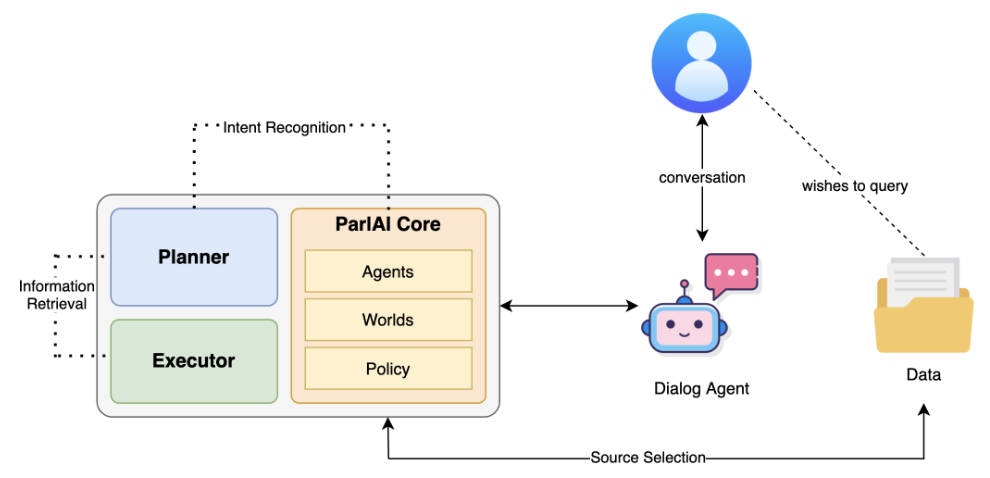Collaborative Assistants
Key Idea
Our work in Collaborative Assistants focuses on creating trustworthy AI systems that work synergistically with humans in sensitive domains. We develop neuro-symbolic architectures combining neural networks with symbolic reasoning, build safety-focused chatbot frameworks, and create adaptive dialog systems using planning and reinforcement learning techniques.
Quick Start
- Intended to help medical students improve interviewing skills with patients by practicing with a chatbot. Try our SafeChat HIV/AIDS Information Tool yourself: fet reliable information on HIV/AIDS (prevention, treatment, living with it) from trusted sources like UNAIDS. [Try it now]
- Intended for chatbot developers. Explore SafeChat framework for building trustworthy domain-specific chatbots [Paper] [GitHub]
News
SafeChat
Collaborators: Vishal Pallagani,
Kausik Lakkaraju, Bharath Muppasani,
Biplav
Srivastava
SafeChat is an architecture that aims to provide a safe and secure
environment for users to interact with AI chatbots in trust-sensitive
domains. It uses a combination of neural (learning-based, including
generative AI) and symbolic (rule-based) methods, together called a
neuro-symbolic approach, to provide known information in easy-to-use
consume forms that are adapted from user interactions (provenance).
The chatbots generated are scalable, quick to build and is evaluated
for trust issues like fairness, robustness and appropriateness of responses.
Representative Publications
- A Vision for Reinventing Credible Elections with Artificial Intelligence
Thirty-Ninth AAAI Conference on Artificial Intelligence (AAAI-25), Philadelphia, USA, Feb 2025
Biplav Srivastava
[Paper] [Slides]
- Do Voters Get the Information They Want? Understanding Authentic Voter FAQs in the US
and How to Improve for Informed Electoral Participation
TrustNLP workshop at Annual Conference of the North American Chapter of the Association for Computational Linguistics (NAACL 2025), Albuquerque, USA, May 2025
Vipula Rawte, Deja N Scott, Gaurav Kumar, Aishneet Juneja, Bharat Sowrya Yaddanapalli, Biplav Srivastava,
[Paper]
- Disseminating Authentic Public Messages using Chatbots - A Case Study with
ElectionBot-SC to Understand and Compare Chatbot Behavior for Safe Election
Information in South Carolina
AI for Public Mission Workshop at Thirty-Ninth AAAI Conference on Artificial Intelligence (AAAI-25), Philadelphia, USA, Feb 2025
Nitin Gupta, Vansh Nagpal, Bharath Muppasani, Kausik Lakkaraju, Sara Jones, Biplav Srivastava
[Paper]
- On Safe and Usable Chatbots for Promoting Voter Participation
AAAI AI Magazine, 2023
Bharath Muppasani, Vishal Pallagani, Kausik Lakkaraju, Shuge Lei, Biplav Srivastava, Brett Robertson, Andrea Hickerson, Vignesh Narayanan
[Paper] - LLMs for Financial Advisement: A Fairness and Efficacy Study in Personal Decision
Making
4th ACM International Conference on AI in Finance: ICAIF'23, New York, 2023
Kausik Lakkaraju, Sara Rae Jones, Sai Krishna Revanth Vuruma, Vishal Pallagani, Bharath C Muppasani and Biplav Srivastava
[Paper] [Slides] - Trust and ethical considerations in a multi-modal, explainable AI-driven chatbot
tutoring system: The case of collaboratively solving Rubik’s Cube
ICML 2023 TEACH Conversational AI Workshop, Hawaii, 2023
Kausik Lakkaraju, Vedant Khandelwal, Biplav Srivastava, Forest Agostinelli, Hengtao Tang, Prathamjeet Singh, Dezhi Wu, Matt Irvin, Ashish Kundu
[Paper]
Representative SafeChat Framework Usage and Instances
- Use of SafeChat in teaching how to build chatbots in CSCE 580 (Fall 2023; 25 students).
- Use of SafeChat by student in CSCE 580 (Fall 2023) to create chatbot interface for Water Quality Decider System.
- Use of SafeChat in creating Garnet n Talk, a chatbot designed to answer questions about the University of South Carolina. This project was awarded Best Idea in the USC Spring 2024 Hackathon.
- Use of SafeChat for creating chatbot in election for (Mississippi).
- Use of SafeChat for creating ALLURE chatbot in education.
Generic Information
Retrieval Chatbot using Planning & RL
Collaborators: Vishal Pallagani,
Biplav
Srivastava
In this body of work, we address the challenge of enabling users to effectively search large datasets, such
as product catalogs and open data, using natural language. Many users find it difficult to interact with
these datasets due to unfamiliarity with query languages. Our system allows users to retrieve information
through a dialog-based interface that adapts to the underlying structure of the data, making it versatile
across various domains. By incorporating planning techniques and reinforcement learning (RL), the system can
learn and optimize its search strategies over time. We demonstrate the system’s effectiveness using datasets
such as UNSPSC and ICD-10, highlighting its capability to enhance information retrieval through the combined
use of planning and RL.
Representative Publications
- A generic dialog agent for information retrieval based on automated planning within a reinforcement
learning platform
Bridging the Gap Between AI Planning and Reinforcement Learning (PRL) Workshop at ICAPS, 2021
[Paper] [BibTex] [Poster] [Github] - PRUDENT-A Generic Dialog Agent for Information Retrieval That Can Flexibly Mix Automated Planning and
Reinforcement Learning
ICAPS Demonstration Track, 2021
[Paper] [BibTex] [Demo] [Github]

For more details, visit: https://sites.google.com/site/biplavsrivastava/research-1/dialog